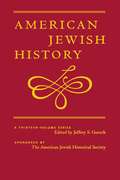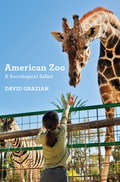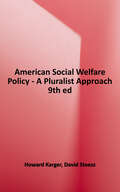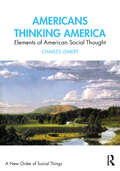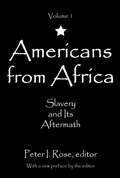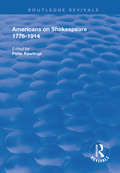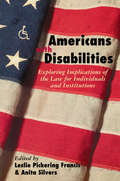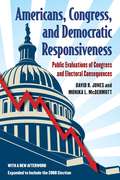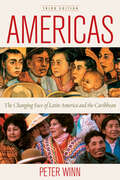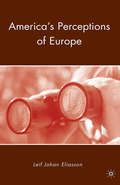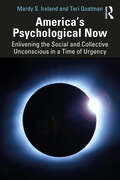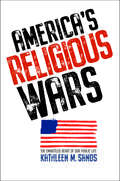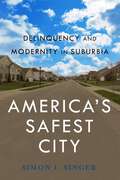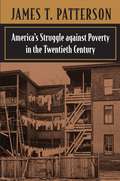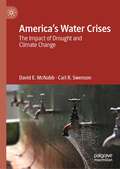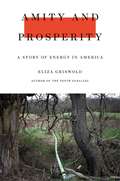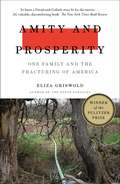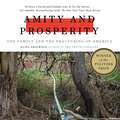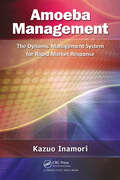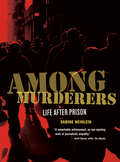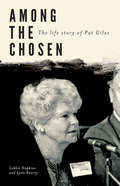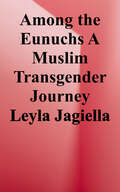- Table View
- List View
American Zionism: American Jewish History (American Jewish History)
by Jeffrey S. GurockFirst Published in 1998. Routledge is an imprint of Taylor & Francis, an informa company.
American Zoo
by David GrazianOrangutans swing from Kevlar-lined fire hoses. Giraffes feast on celebratory birthday cakes topped with carrots instead of candles. Hi-tech dinosaur robots growl among steel trees, while owls watch animated cartoons on old television sets. In American Zoo, sociologist David Grazian takes us on a safari through the contemporary zoo, alive with its many contradictions and strange wonders. Trading in his tweed jacket for a zoo uniform and a pair of muddy work boots, Grazian introduces us to zookeepers and animal rights activists, parents and toddlers, and the other human primates that make up the zoo's social world. He shows that in a major shift away from their unfortunate pasts, American zoos today emphasize naturalistic exhibits teeming with lush and immersive landscapes, breeding programs for endangered animals, and enrichment activities for their captive creatures. In doing so, zoos blur the imaginary boundaries we regularly use to separate culture from nature, humans from animals, and civilization from the wild. At the same time, zoos manage a wilderness of competing priorities--animal care, education, scientific research, and recreation--all while attempting to serve as centers for conservation in the wake of the current environmental and climate-change crisis. The world of the zoo reflects how we project our own prejudices and desires onto the animal kingdom, and invest nature with meaning and sentiment.A revealing portrayal of comic animals, delighted children, and feisty zookeepers, American Zoo is a remarkable close-up exploration of a classic cultural attraction.
American by Paper: How Documents Matter in Immigrant Literacy
by Kate VieiraAmerican by Paper reveals how two groups of immigrants who share a primary language nevertheless have very different experiences of literacy in the United States. It describes the social realities facing documented and undocumented immigrants who use everyday acts of writing to negotiate papers—the visas, green cards, and passports that promise access to the American Dream. It is both an ethnography, filled with illuminating details about contemporary immigrant lives, and a critical intervention into two leading—and conflicting—scholarly ideas of literacy and its social role.Although popular thinking and scholarship have viewed literacy as a method of culturally assimilating immigrants into the nation, Kate Vieira finds that upward mobility and social inclusion in the United States are tied to literacy in complex ways. She draws from extensive interviews with Portuguese-speaking migrants who live and work together in a former mill town in Massachusetts that she calls South Mills: one group from the Azores, who are usually documented, and another from Brazil, who are usually undocumented. She explains how these migrants experience literacy not as a vehicle for assimilation (as educational policy makers often assert) nor as a means of resisting oppression (as literacy scholars often hope) but instead as tied up in papers, particularly in the papers that confer legal status. Papers and literacy are inextricably bound together, both promoting and constraining opportunities, and they shape why and how migrants read and write.Vieira builds on insights from literacy theories that have long been in opposition to each other in order to develop a new sociomaterial theory of literacy, one that takes into account its inseparable link to paper, forms, and documentation. This point of view leads to a deeper understanding of how literacy actually accrues meaning by circulating, and recirculating, through institutions and the lives of individuals.
American social welfare policy: a pluralist approach, Ninth edition
by David Stoesz Howard KargerThis edition of American Social Welfare Policy attempts to provide the information necessary for understanding social welfare policy nationally and internationally. In addition to covering the basic concepts, policies, and programs of the American welfare state, the text includes information on the voluntary nonprofit sector, the for-profit corporate sector, and the new strategy in social policy (i.e., tax policy and expenditures)--Provided by publisher.
Americanism in the Twenty-First Century
by Deborah J. SchildkrautThis book explores public opinion about being and becoming American, and its implications for contemporary immigration debates. It focuses on the causes and consequences of two aspects of American identity: how people define being American and whether people think of themselves primarily as American rather than as members of a panethnic or national origin group. Importantly, the book evaluates the claim - made by scholars and pundits alike - that all Americans should prioritize their American identity instead of an ethnic or national origin identity. It finds that national identity within American democracy can be a blessing or a curse. It can enhance participation, trust, and obligation. But it can be a curse when perceptions of deviation lead to threat and resentment. It can also be a curse for minorities who are attached to their American identity but also perceive discrimination. The notion of American identity is a predisposition that the government has good reason to cultivate, but also good reason to approach with caution.
Americans Thinking America: Elements of American Social Thought (A New Order of Social Things)
by Charles LemertIn this dynamic book, Charles Lemert elaborates a vigorous, distinctive, and creative American tradition in social thought.American social theory has tended to be overshadowed by European social thought. Yet, looking deeper, Americans have always made important contributions to social theory. Drawing upon the work of a dazzling array of both seminal and unjustly overlooked philosophers, sociologists, litterateurs, and political activists, Lemert constructs a coherent yet variegated intellectual framework for understanding American social theory and culture from the colonial era to the present. In doing so, Lemert analyses American intellectual attitudes on race, gender, popular culture, political thought, capitalism, and social movements, while also exploring schools of thought from transcendentalism and pragmatism to interactionism and intersectionality.In his inimitable style, Charles Lemert, a master of "finding theory where you’d least expect it," offers a masterful rendering of the American tradition in social theory. In doing so, Lemert shines new light on social theory and American history. Both authoritative and accessible, this indispensable work will be essential reading for students, scholars, and general readers with interests in social theory and American social history.
Americans from Africa: Slavery and its Aftermath
by Peter I. RoseAmericans from Africa seeks to convey varying perspectives on the "Black Experience" in the United States and its controversial history. This volume, Slavery and Its Aftermath, deals with four major issues: the extent of African influences on the lives of those enslaved and brought to America, beginning with an essay on "Africanisms in Everyday Life" by Melville J. Herskovits; the impact of slavery on personality and social structure, sometimes called "The Elkins Debate;" similarities and differences in life for African Americans in the South and in the North; and matters of community, class, and family, including the full text of the "Moynihan Report" and several pointed critiques.In addition to the commentaries by and on the works of Herskovits, Elkins, and Daniel Patrick Moynihan, other contributors to Volume I include Kenneth B. Clark, Mina Caulfield Davis, E. Franklin Edwards, Eugene Genovese, Ulf Hannerz, Charles S. Johnson, Leroi Jones, and Charles Keil.The second volume, Old Memories, New Moods, contains essays on the roots of black protest; the background and character of the Civil Rights Movement; interpretations of the impact and significance of Black Power, and varied views on changing self-images of being African American.
Americans on Shakespeare, 1776-1914 (Routledge Revivals)
by Peter RawlingsPublished in 1999. Shakespeare is ‘the great author of America’ declared James Fenimore Cooper in 1828. The ambiguous resonance of this claim is fully borne out in this collection of writings on Shakespeare by over forty prominent Americans, spanning the period between the War of independence and the outbreak of the First World War. Featured writers include: Ralph Waldo Emerson, Edgar Allen Poe, Herman Melville, Nathaniel Hawthorne, Abraham Lincoln, Walt Whitman and Mark Twain. The essays, many of which are reprinted here for the first time, are arranged in chronological order and provide a fascinating conspectus of American attitudes to Shakespeare, from Revolutionary and Transcendentalist approaches through to the influential interventions of professional American critics in the early twentieth century. The extraordinary and bizarre contribution to the Shakespeare debut by Delia Bacon is exemplified by the inclusion of her 1856 article which is reprinted in its entirety. Americans on Shakespeare charts the emergence of an American literary tradition, and the gradual appropriation of Shakespeare as part of the American search for cultural identity; an identity whose domination is set to continue into the twenty-first century.
Americans with Disabilities
by Anita Silvers Leslie FrancisIn this groundbreaking work, leading philosophers, legal theorists, bioethicists, and policy makers offer incisive looks into the philosophical and moral foundations of disability law and policy.
Americans, Congress, and Democratic Responsiveness: Public Evaluations of Congress and Electoral Consequences
by David R. Jones Monika L. Mcdermott"Jones and McDermott restore meaning to democratic responsibility by finding that public evaluations affect Congress. In contrast to the popular depiction of the representatives controlling the represented rampant in the political science literature, Jones and McDermott show that the people are in control, determining not only the direction of policy in Congress, but also who stays, who retires, and who faces difficult reelection efforts. This book makes an important correction to our understanding of how Congress operates. " ---Sean M. Theriault, University of Texas at Austin Voters may not know the details of specific policies, but they have a general sense of how well Congress serves their own interests; and astute politicians pay attention to public approval ratings. When the majority party is unpopular, as during the 2008 election, both voters and politicians take a hand in reconfiguring the House and the Senate. Voters throw hard-line party members out of office while candidates who continue to run under the party banner distance themselves from party ideology. In this way, public approval directly affects policy shifts as well as turnovers at election time. Contrary to the common view of Congress as an insulated institution, Jones and McDermott argue that Congress is indeed responsive to the people of the United States. David R. Jones is Professor of Political Science at Baruch College, City University of New York. Monika L. McDermott is Associate Professor of Political Science at Fordham University.
Americas: The Changing Face Of Latin America and the Caribbean
by Peter WinnStunning in its sweep, Americas is the most authoritative history available of contemporary Latin America and the Caribbean. From Mexico to Tierra del Fuego, and from Cuba to Trinidad and Tobago, Americas examines the historical, demographic, political, social, cultural, religious, and economic trends in the region.
America’s Perceptions of Europe
by Leif Johan EliassonThis book seeks to rectify Americans' views of its closest ally, Europe - an ambitious task, but one sorely lacking in the literature. Many prejudices about Europe surface in headlines, while others remain latent, but they are real, pervasive and ingrained.
America’s Psychological Now: Enlivening the Social and Collective Unconscious in a Time of Urgency.
by Teri Quatman Mardy IrelandThis book explores the causes behind Trump's victory in the 2016 US presidential election and asks how a psychoanalytic understanding of the social unconscious can help us plot a new direction for the future in US politics and beyond.It first describes the social/psychological threads that are the now of American culture. Seeds of hope are discovered through an in-depth examination of the American idea of excess as represented by Trump, its archetypal figure. Essential psychoanalytic ideas such as, the fundamental human condition of living with both individual and social unconscious, the psychic feminine principal, the notion of psychic valence and more are illustrated as psychic integrations necessary for America to move towards a redemptive positive social change. This book combines feminist exploration with playful illustrative imagery and mythic story—aiming to awaken minds across generations.America’s Psychological Now is key reading for psychoanalysis, psychologists, political theorists, and anyone wishing to understand better how the social and political systems could be changed for the future.
America’s Religious Wars: The Embattled Heart of Our Public Life
by Kathleen M. SandsHow American conflicts about religion have always symbolized our foundational political values When Americans fight about “religion,” we are also fighting about our conflicting identities, interests, and commitments. Religion-talk has been a ready vehicle for these conflicts because it is built on enduring contradictions within our core political values. The Constitution treats religion as something to be confined behind a wall, but in public communications, the Framers treated religion as the foundation of the American republic. Ever since, Americans have translated disagreements on many other issues into an endless debate about the role of religion in our public life. Built around a set of compelling narratives—George Washington’s battle with Quaker pacifists; the fight of Mormons and Catholics for equality with Protestants; Teddy Roosevelt’s concept of land versus the Lakota’s concept; the creation-evolution controversy; and the struggle over sexuality—this book shows how religion, throughout American history, has symbolized, but never resolved, our deepest political questions.
America’s Safest City: Delinquency and Modernity in Suburbia (New Perspectives in Crime, Deviance, and Law #3)
by Simon I. SingerWinner of the American Society of Criminology 2015 Michael J. Hindelang Book Award for the Most Outstanding Contribution to Research in CriminologySince the mid-1990s, the fast-growing suburb of Amherst, NY has been voted by numerous publications as one of the safest places to live in America. Yet, like many of America’s seemingly idyllic suburbs, Amherst is by no means without crime—especially when it comes to adolescents. In America’s Safest City, noted juvenile justice scholar Simon I. Singer uses the types of delinquency seen in Amherst as a case study illuminating the roots of juvenile offending and deviance in modern society. If we are to understand delinquency, Singer argues, we must understand it not just in impoverished areas, but in affluent ones as well.Drawing on ethnographic work, interviews with troubled youth, parents and service providers, and extensive surveys of teenage residents in Amherst, the book illustrates how a suburban environment is able to provide its youth with opportunities to avoid frequent delinquencies. Singer compares the most delinquent teens he surveys with the least delinquent, analyzing the circumstances that did or did not lead them to deviance and the ways in which they confront their personal difficulties, societal discontents, and serious troubles. Adolescents, parents, teachers, coaches and officials, he concludes, are able in this suburban setting to recognize teens’ need for ongoing sources of trust, empathy, and identity in a multitude of social settings, allowing them to become what Singer terms ‘relationally modern’ individuals better equipped to deal with the trials and tribulations of modern life. A unique and comprehensive study, America’s Safest City is a major new addition to scholarship on juveniles and crime in America.Crime, Law and Social Change's special issue on America's Safest City
America’s Struggle against Poverty in the Twentieth Century: Enlarged Edition
by James T. PattersonThis new edition of Patterson's widely used book carries the story of battles over poverty and social welfare through what the author calls the "amazing 1990s," those years of extraordinary performance of the economy. He explores a range of issues arising from the economic phenomenon--increasing inequality and demands for use of an improved poverty definition. He focuses the story on the impact of the highly controversial welfare reform of 1996, passed by a Republican Congress and signed by a Democratic President Clinton, despite the laments of anguished liberals.
America’s Water Crises: The Impact of Drought and Climate Change
by David E. McNabb Carl R. SwensonThis book is focused exclusively on water problems in the 48 U.S. states. The authors provide an accessible overview of the work of many federal, state and academic researchers and water system administrators whose investigations have focused on the state of water and the water crisis now accelerating in the United States. David McNabb and Carl Swenson seek to bring to a wider audience some of the current research findings and data on the perilous state of the United States’ surface and groundwater resources during this time of climate change and the extreme drought taking place in many sections of the nation. Descriptions of the water resource systems are based on research and the subsequent findings published by water scientists in the United States Geological Survey, the Environmental Protection Agency, the U.S. Corps of Engineers and water related agencies of the Departments of Agriculture and of the Interior and state and local water management agencies.
Amity and Prosperity: One Family and the Fracturing of America
by Eliza Griswold<p>In Amity and Prosperity, the prizewinning poet and journalist Eliza Griswold tells the story of the energy boom’s impact on a small town at the edge of Appalachia and one woman’s transformation from a struggling single parent to an unlikely activist. <p>Stacey Haney is a local nurse working hard to raise two kids and keep up her small farm when the fracking boom comes to her hometown of Amity, Pennsylvania. Intrigued by reports of lucrative natural gas leases in her neighbors’ mailboxes, she strikes a deal with a Texas-based energy company. Soon trucks begin rumbling past her small farm, a fenced-off drill site rises on an adjacent hilltop, and domestic animals and pets start to die. When mysterious sicknesses begin to afflict her children, she appeals to the company for help. Its representatives insist that nothing is wrong. <p>Alarmed by her children’s illnesses, Haney joins with neighbors and a committed husband-and-wife legal team to investigate what’s really in the water and air. Against local opposition, Haney and her allies doggedly pursue their case in court and begin to expose the damage that’s being done to the land her family has lived on for centuries. Soon a community that has long been suspicious of outsiders faces wrenching new questions about who is responsible for their fate, and for redressing it: The faceless corporations that are poisoning the land? The environmentalists who fail to see their economic distress? A federal government that is mandated to protect but fails on the job? Drawing on seven years of immersive reporting, Griswold reveals what happens when an imperiled town faces a crisis of values, and a family wagers everything on an improbable quest for justice.</p>
Amity and Prosperity: One Family and the Fracturing of America - Winner of the Pulitzer Prize for Non-Fiction 2019
by Eliza GriswoldWinner of the 2019 Pulitzer Prize for General Nonfiction'At heart a David and Goliath story fit for the movies ... [A] valuable, discomforting book' The New York Times Book ReviewSeven years in the making, Amity and Prosperity tells the story of the energy boom's impact on a small town at the edge of Appalachia and of one woman's transformation from a struggling single parent to an unlikely activist.Stacey Haney is a local nurse working hard to raise two kids and keep up her small farm when the fracking boom comes to her hometown of Amity, Pennsylvania. Intrigued by reports of lucrative natural gas leases in her neighbours' mailboxes, she strikes a deal with a Texas-based energy company. Soon trucks begin rumbling past her small farm, a fenced-off drill site rises on an adjacent hilltop, and domestic animals and pets start to die. When mysterious sicknesses begin to afflict her children, she appeals to the company for help. Its representatives insist that nothing is wrong.Alarmed by her children's illnesses, Haney joins with neighbours and a committed husband-and-wife legal team to investigate what's really in the water and air. Against local opposition, Haney and her allies doggedly pursue their case in court and begin to expose the damage that's being done to the land her family has lived on for centuries. Drawing on seven years of immersive reporting, prizewinning poet and journalist Eliza Griswold reveals what happens when an imperilled town faces a crisis of values, and a family wagers everything on an improbable quest for justice.
Amity and Prosperity: One Family and the Fracturing of America - Winner of the Pulitzer Prize for Non-Fiction 2019
by Eliza GriswoldWinner of the 2019 Pulitzer Prize for General NonfictionSeven years in the making, Amity and Prosperity tells the story of the energy boom's impact on a small town at the edge of Appalachia and of one woman's transformation from a struggling single parent to an unlikely activist.Stacey Haney is a local nurse working hard to raise two kids and keep up her small farm when the fracking boom comes to her hometown of Amity, Pennsylvania. Intrigued by reports of lucrative natural gas leases in her neighbours' mailboxes, she strikes a deal with a Texas-based energy company. Soon trucks begin rumbling past her small farm, a fenced-off drill site rises on an adjacent hilltop, and domestic animals and pets start to die. When mysterious sicknesses begin to afflict her children, she appeals to the company for help. Its representatives insist that nothing is wrong.Alarmed by her children's illnesses, Haney joins with neighbours and a committed husband-and-wife legal team to investigate what's really in the water and air. Against local opposition, Haney and her allies doggedly pursue their case in court and begin to expose the damage that's being done to the land her family has lived on for centuries. Drawing on seven years of immersive reporting, prizewinning poet and journalist Eliza Griswold reveals what happens when an imperilled town faces a crisis of values, and a family wagers everything on an improbable quest for justice.(P)2018 Macmillan Audio
Amoeba Management: The Dynamic Management System for Rapid Market Response
by Kazuo InamoriEspecially effective in dynamic and highly competitive environments, the Amoeba Management System has received attention from the Harvard Business Review and has already been successfully adopted at more than 400 companies around the world. At the heart of this innovative management system is a business philosophy based on doing the right thing as
Amoeba Management: The Dynamic Management System for Rapid Market Response
by Kazuo InamoriEspecially effective in dynamic and highly competitive environments, the Amoeba Management System has received attention from the Harvard Business Review and has already been successfully adopted at more than 400 companies around the world. At the heart of this innovative management system is a business philosophy based on doing the right thing as
Among Murderers: Life After Prison
by Sabine HeinleinWhat is it like for a convicted murderer who has spent decades behind bars to suddenly find himself released into a world he barely recognizes? What is it like to start over from nothing? To answer these questions Sabine Heinlein followed the everyday lives and emotional struggles of Angel Ramos and his friends Bruce and Adam--three men convicted of some of society's most heinous crimes--as they return to the free world. Heinlein spent more than two years at the Castle, a prominent halfway house in West Harlem, shadowing her protagonists as they painstakingly learn how to master their freedom. Having lived most of their lives behind bars, the men struggle to cross the street, choose a dish at a restaurant, and withdraw money from an ATM. Her empathetic first-person narrative gives a visceral sense of the men's inner lives and of the institutions they encounter on their odyssey to redemption. Heinlein follows the men as they navigate the subway, visit the barber shop, venture on stage, celebrate Halloween, and loop through the maze of New York's reentry programs. She asks what constitutes successful rehabilitation and how one faces the guilt and shame of having taken someone's life. With more than 700,000 people being released from prisons each year to a society largely unprepared--and unwilling--to receive them, this book provides an incomparable perspective on a pressing public policy issue. It offers a poignant view into a rarely seen social setting and into the hearts and minds of three unforgettable individuals who struggle with some of life's harshest challenges.
Among the Chosen: The Life Story of Pat Giles
by Lekkie Hopkins Lynn RoartySpotlighting a woman who was strongly dedicated to improving the lives of the disadvantaged, this biography celebrates the accomplishments of Pat Giles. Her entrance into Parliament as a Labor politician is reviewed, acknowledging that she came on board not as a raw recruit but as an experienced trade unionist, policymaker, feminist campaigner, and grassroots activist. This account reveals a woman whose determination never faltered and whose work ethic never flagged, telling the story of an activist working from within the established order to effect social change.
Among the Eunuchs: A Muslim Transgender Journey
by Leyla JagiellaFrom an early age, Leyla Jagiella knew that her life would be defined by two things: being Muslim and being trans. Struggling to negotiate these identities in her conservative, small German hometown, she travelled to India and Pakistan, where her life was changed by her time among third-gender communities. <p><p>Known today as hijras in India and khwajasaras in Pakistan, these predominantly Muslim communities once held important political, social and spiritual positions. They were respected as agents of the supernatural, with powers to bless or curse, and often worked as eunuchs in the harems and palaces of the Muslim aristocracy. But under British colonialism the hijras were criminalized and persecuted, entrenching long-lasting taboos that these communities continue to fight against today. <p><p>Among the Eunuchs reveals a vast variety of interpretations of religion, gender and sexuality, illuminating how deeply culture informs our lifestyles and experiences. In a world where identity is an ideological battlefield, Jagiella complicates binaries and dogma with a rich and reflective analysisof gender across the world. Her fascinating journey speaks to all who draw from multiple cultural roots, have relations across borders, or find themselves juggling more than one identity.
